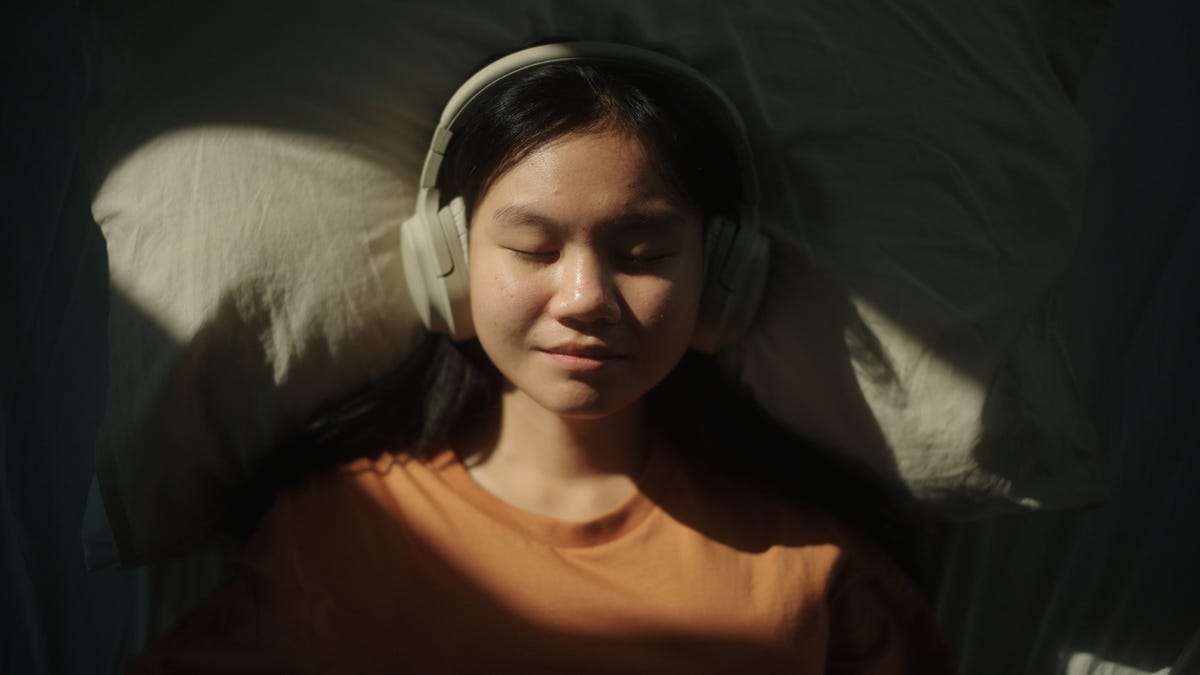Sleep is a fragile state that can be disrupted by loud (or quiet) sounds, from a creaky door or purring cat to sirens or heavy winds outside. If you wake up more than four times a night, you prevent yourself from getting the proper restorative sleep needed for your mental and physical health. Not to mention, you won’t feel as refreshed as quality sleep makes you feel.
Playing gentle and relaxing sounds while you sleep can help cover abrupt noises occurring throughout the night that would otherwise wake you up.
It’s worth noting that it’s not necessarily the noise itself but rather the sudden change in noise that’s most likely to wake you up. That’s where white and brown noise come in. These specific frequencies boast unique benefits, including the ability to mask disruptive sounds, improve thinking skills, promote better sleep and more.
But which sound is better? Let’s dive into the research and descriptions of each.
White noise
White noise is a combination of all frequencies on the spectrum that humans can hear, which has a high-pitched, staticky sound. It’s the most well-known color noise and is a sound that doesn’t typically occur in nature. It includes sounds like:
- TV or radio static
- The whir of a fan or vacuum
- A noisy air conditioner
Brown noise
Brown noise is a deep sound with more of a bass tone and less of a hiss than white noise. Brown noise plays low-frequency sounds and omits high-frequency sounds like white noise, making it smoother and more manageable for some individuals. This includes sounds like:
- Rainfall
- Thunder
- A shower with strong water pressure
Using a noise machine at night can promote better sleep.
The best noise for sleep
White noise vs. brown noise
TikTok saw a lot of chatter about brown noise recently, as users — particularly those with ADHD — said listening to brown noise helped calm the mind and improved their sleep quality. However, if you ask the scientific community about the benefits of brown noise for sleep, they’d say there needs to be more research.
While findings aren’t 100% conclusive, there is positive research to back the possible sleep-promoting benefits of white noise.
A 2017 study found that broadband sound (aka white noise) played at 46 decibels reduced the amount of time it took for participants to fall asleep by 38% and improved overall sleep quality.
A more recent 2021 study conducted in New York City found participants who cited their noisy environment as the reason for their poor sleep quality saw a significant improvement in their sleep after listening to white noise at bedtime.
Another study involving ICU patients in India saw similar results; white noise helped promote better sleep quality for participants trying to sleep in a noisy setting.
These studies demonstrate that white noise can be effective in drowning out distracting, unpleasant sounds in the background of your environment and promote better sleep.
This isn’t to say that brown noise won’t help you fall asleep, it just means that more intensive studies need to be completed before we can give it a science-backed stamp of approval. But brown noise sounds more natural and can be easier on the ears, especially if you’re sensitive to sound.
Some experts say it ultimately comes down to personal preference — maybe you like the sound of a running fan to fall asleep (white noise), or you prefer the sound of waves crashing against the shore (brown).
I use my Hatch sunrise alarm clock to play calming campfire sounds before bed. I’ve found it not only lulls me to sleep but keeps my mind from focusing on other nighttime noises. It ultimately depends on which sounds you find most relaxing and helpful for sleep.
Tips for using sound to fall asleep
Whether you choose to listen to white or brown noise, here are ways you can get the most out of utilizing sound for sleep.
- Be mindful of volume when listening to sounds to fall asleep. Not only can it wake you up and disrupt your sleep, but constantly listening to loud music can harm your hearing. Try to keep your white noise volume to 50 decibels or lower.
- Set a timer if you can. Too much consistent noise while you sleep may disrupt your sleep quality and hearing abilities. Apps like White Noise Generator and Dark Noise have timers, so your sounds won’t play through the whole night.
- Trial and error. If white noise doesn’t seem to help you sleep better, make the switch to brown. In addition to white and brown noise, other noise colors, such as pink and blue, may help you sleep better.
- Decide how you’d like to listen. Try using a pair of headphones meant for sleeping or even a sleep mask with built-in speakers. If you don’t sleep well with headphones or sleep masks, you can opt for a noise machine that goes on your nightstand instead. There are also a ton of relaxing YouTube videos with different colored noises and calming scenes that you can play on your TV — just be aware of potential burn-in issues if you have an OLED screen.
- Optimize your bedroom for sleep. Keep your lights off and temperature low to prevent other disruptions from harming your sleep. Light can delay your body’s melatonin production and keep you from being sleepy, while a room that’s too hot can make it too difficult to fall asleep.

